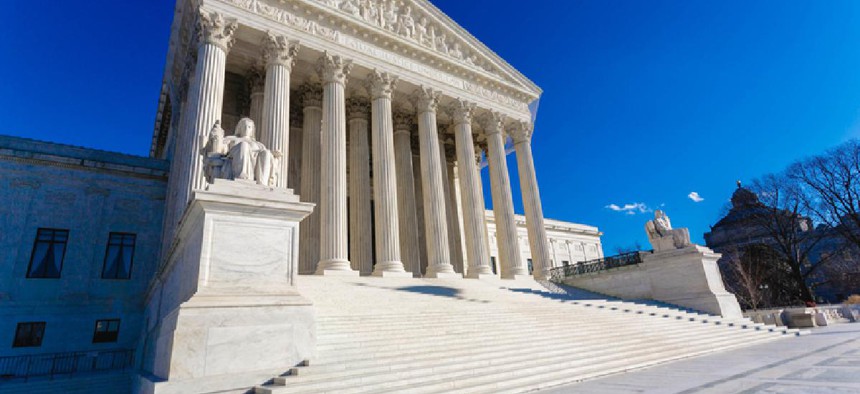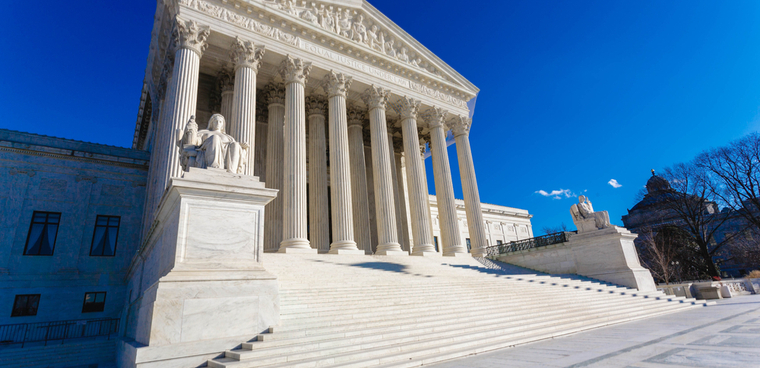High Court rules that public-sector unions can't require fees from non-members

In a 5-4 decision, the Supreme Court overturned a 40-year-old ruling that permitted public-sector unions to collect "agency fees" from non-members to cover costs of collective bargaining.

In a 5-4 decision, the Supreme Court overturned a 40-year-old ruling that permitted public-sector unions to collect "agency fees" from non-members to cover costs of collective bargaining.
The June 27 decision in Janus v. American Federation of State, County, and Municipal Employees upends a system by which unions were able to collect fees from non-members who worked under union contracts to cover negotiations.
Illinois government employee Mark Janus brought the case. He refused to join the AFSCME local union that represented state employees because he disagreed with its collective bargaining and ideological stances. He was still charged an "agency fee" -- a percentage of union dues -- to cover union-related activities.
Lawyers for Janus contested the fee on First Amendment grounds, appealing to the Supreme Court after the U.S. Court of Appeals for the 7th Circuit ruled against them.
The 5-4 decision led by Justice Samuel Alito upended a 1977 precedent, Abood v. Detroit Board of Education, that said government unions could use these fees for union costs but not political ads.
Writing for the majority, Alito stated that, "because the compelled subsidization of private speech seriously impinges on First Amendment rights, it cannot be casually allowed."
Chief Justice John Roberts, Justices Anthony Kennedy, Clarence Thomas and Neil Gorsuch joined Alito's majority opinion.
In her dissent, Justice Elana Kagan said that public-sector workers and governments would lose under the decision, now that workers are allowed to obtain the contractual benefit of collective bargaining without paying.
"Public employee unions will lose a secure source of financial support. State and local governments that thought fair-share provisions furthered their interests will need to find new ways of managing their workforces. Across the country, the relationships of public employees and employers will alter in both predictable and wholly unexpected ways," Kagan wrote.
Rep. Nancy Pelosi (D-Calif.), the leader of the House Democrats, agreed.
"The Supreme Court’s radical ruling tramples over the freedom and basic rights of more than 17 million public workers. The Court’s decision to reverse decades of precedent will have drastic, destructive and long-lasting impacts on all hard-working Americans’ good-paying jobs, wages, health care, retirement and workplace conditions," Pelosi said in a statement.
In his opinion, Alito argued that federal employee unions attract members even though such agency fees at issue in Janus are banned by federal law.
"Under federal law, a union chosen by majority vote is designated as the exclusive representative of all the employees, but federal law does not permit agency fees…Nevertheless, nearly a million federal employees -- about 27% of the federal work force -- are union members," Alito wrote.
Soraya King, president of the American Federation of Government Employees, Local 32 in Washington, D.C., told FCW that the ruling may likely create an "administrative headache" that could cause AFGE to lose members. She also worries that Janus, in conjunction with several executive orders on the federal workforce that include union restrictions, could have an impact on union membership.
"In these tumultuous times, with these executive orders, with this current administration, we have people who may waver and have concerns with being in a union," King said.
AFGE National President J. David Cox Sr. said in a statement that the Court's decision, coupled with the executive orders, jeopardized public-sector union rights and protections.
"When union members pay to negotiate a contract for their workplace, everyone who's covered by that contract takes home higher pay and benefits, has greater job security, enjoys improved health and safety standards, and gets help in settling workplace disputes," Cox said, urging non-members to join.
"If you're covered by the union contract but you don't belong to the union, it's time to join your union and pay for the benefits you receive -- because those benefits could vanish tomorrow."



